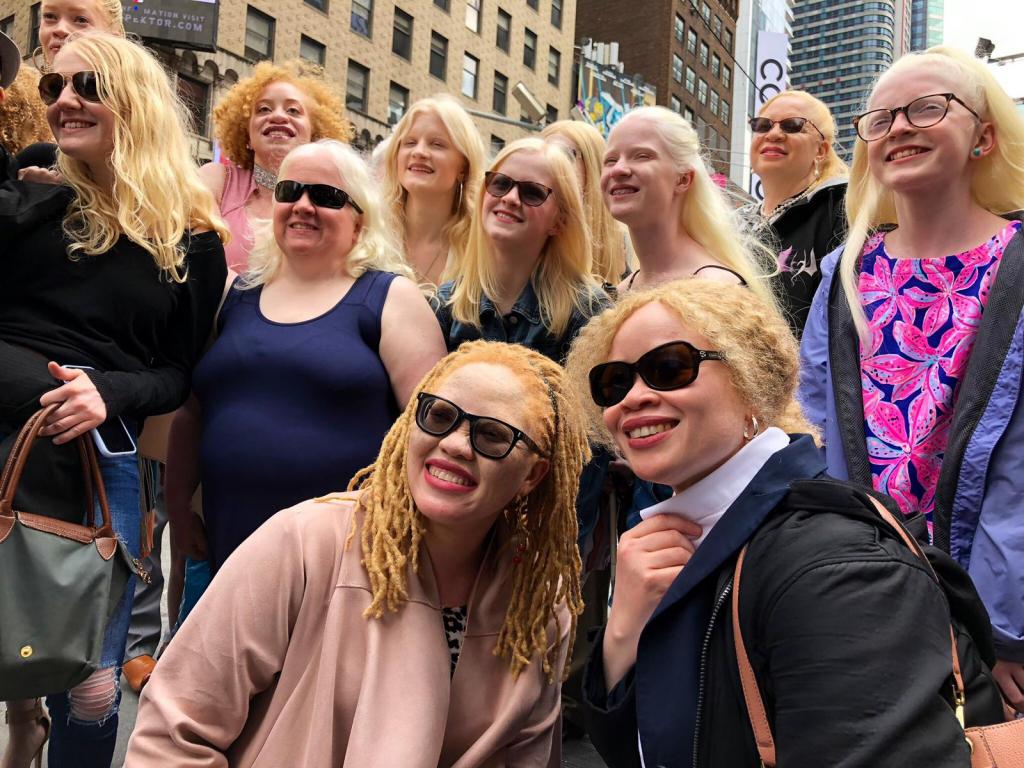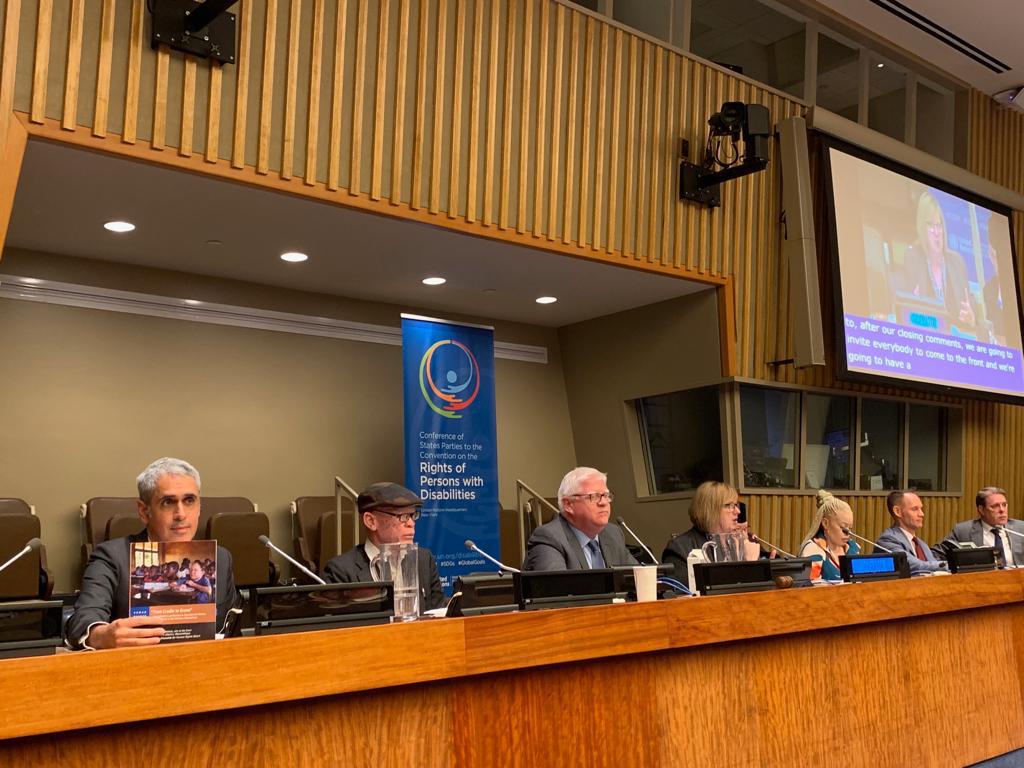Secondary menu
From UN Advocacy to Cocktail Parties: Advocating for the rights of persons with albinism
India Annamanthadoo (3L)
When I accepted the International Human Rights Program (IHRP) summer fellowship, I envisioned myself holed up in a little corner of Flavelle for 16 weeks. I did not imagine myself schmoozing with models at a cocktail party on Fifth Avenue, or discussing world politics with a Kenyan senator whilst Uber-ing to said party. But, as I grabbed another falafel hors d'oeuvre and sidled out of the Uber, my dark corner in Flavelle felt worlds away. Indeed, I can now attest that the IHRP offers students the full international advocacy experience, from desk research to glamorous global networking.
To explain how I found myself mingling with models and politicians, let me rewind. As the IHRP fellow, my main responsibility this summer was supporting the mandate of Ms. Ikponwosa Ero, the UN Independent Expert on Albinism. Albinism is a rare genetic condition in which an individual lacks the gene for producing melanin. Although not everyone with albinism has a disability, the melanin deficit can result in susceptibility to skin cancer and low vision. Unfortunately, in many parts of the world, persons with albinism are subject to a range of human rights abuses, from discrimination to physical attacks. In some countries, persons with albinism, including children, are mutilated or killed due to witchcraft-related myths that their body parts have magical powers, and bring about wealth for the beholder.
With the help of IHRP-alum Anne-Rachelle Boulanger (JD/MGA 2019), I worked with Ms. Ero to draft a report to the UN General Assembly about human rights abuses experienced by persons with albinism globally. Our task was to transform over 90 surveys administered to States and civil society groups into a report of common violations by region.
 Ms. Ikponwosa Ero, the UN Independent Expert on Albinism (front right), and other persons with albinism from around the world gathered at Times Square for the ColorFull billboard reveal. Credit: India Annamanthadoo.
Ms. Ikponwosa Ero, the UN Independent Expert on Albinism (front right), and other persons with albinism from around the world gathered at Times Square for the ColorFull billboard reveal. Credit: India Annamanthadoo.
The process of synthesizing primary data into a coherent, compelling account of human rights issues by region was fascinating. Persons with albinism in each region faced distinct violations and challenges, depending on the social, political, geographical, and economic contexts. For instance, in Africa and some South American countries, persons with albinism are discriminated against because of their skin colour; often, they are viewed as foreigners in their own country and socially excluded by their community. In contrast, in northern European countries, persons with albinism may go undiagnosed well into their adult years as they are indistinguishable from the generally fair-haired and fair-skinned population; this, in turn, limits their access to disability services to which they are entitled.
This process reinforced to me the importance of tailored advocacy —a one-size-fits-all approach to human rights overlooks distinct regional contexts that are key to addressing violations. At the same time, too much granularity can derail efforts to build solidarity, which is necessary to compel government action. Drafting the report challenged my ability to balance these tensions.
In addition to the General Assembly report, I also assisted Ms. Ero in evidence collection in order to convince the UN Human Rights Commission to pass a resolution condemning harmful practices associated with witchcraft. This resolution is strategically important in efforts to address right to life violations of persons with albinism given their susceptibility to ritual attacks for their body parts. My work involved combing through UN and civil society documents to build a database of witchcraft-related human rights violations (e.g. deaths, assaults, and kidnappings). In total, our team documented thousands of victims of such violations in the last decade alone. Before this project, I had never fully grasped the importance of data in advocacy; but I learned that a robust, traceable dataset can be pivotal in a government’s decision to support a human rights issue on the international stage.
Given that most of this work involved sitting at a (very nice) desk, I jumped at the first opportunity to travel for the project. In June, the IHRP team flew to New York City to attend an albinism side event to the Conference of States Parties to the Convention on the Rights of Persons with Disabilities (COSP) at the UN Headquarters. The side event, which coincided with the International Albinism Awareness Day, focused on highlighting the resilience of persons with albinism. It was inspiring to see dozens of people with albinism, from India to Tanzania to Long Island, stand united at the UN, despite the collective adversity they face.
 Former IHRP-director Samer Muscati (far left) and other panellists at the albinism side event at the UN Headquarters in New York City. Credit: India Annamanthadoo.
Former IHRP-director Samer Muscati (far left) and other panellists at the albinism side event at the UN Headquarters in New York City. Credit: India Annamanthadoo.
After the UN event, we made our way over to Times Square for a billboard reveal. The billboard was part of the ColorFull Campaign, a campaign designed to raise awareness about albinism, and which features supermodel Diandra Forrest, herself a person with albinism. The grand reveal was followed by a consultation to discuss issues faced by members of the albinism community. Afterwards, we invited a senator from Kenya (who had been present at all of the day’s events) to Uber with us to the ColorFull Campaign launch party on Fifth Avenue. Driving through Times Square while learning about the Kenyan political system from an elected member of parliament was a surreal experience that I will never forget. Upon arrival at the party, we tried to blend in with the model-studded crowd (which included Diandra Forrest) but our hunger for free hors d'oeuvres quickly blew our cover.
As the night wound down, I reflected on all of the incredible growth opportunities I have had access to as a result of my involvement with the IHRP. In addition to my work on albinism, I also developed content for a global mental health campaign with Human Rights Watch and provided support on two refugee and immigration projects. In just 16 weeks, I developed networks across several organizations and countries, honed my primary research skills, and continued to learn the art of global advocacy. And although my time with IHRP has come to an end, I will be continuing my work with Ms. Ero as an independent legal consultant until June 2020. This will entail drafting a report for a new global alliance on albinism, and rapporteuring meetings in Paris and at the African Union in Addis Ababa, Ethiopia.
After a summer at the IHRP, I feel better positioned to take on the many facets of international human rights work—from UN advocacy to cocktail parties. Thank you to the IHRP for an amazing summer!
